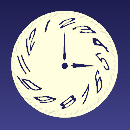

Dec 2017
The election for the CSD-N Board of Directors has concluded. We welcome new board members Karen Martin, Jen Heller Meservey, and Jason Myatt. Incumbent Peter Mansbach was re-elected to the board.
Dr Phyllis Zee, noted sleep researcher (and member of the CSD-N Medical Advisory Board) is organizing a new study of circadian disordered patients, and has expressed interest in using the Circadian Sleep Disorders Network registry to recruit patients. This will involve genetic sampling, which can be done at the patient's location.
Reminder: if you haven't yet signed up for the registry and taken our Circadian Rhythm Sleep Disorders survey, please do so at www.CircadianSleepDisorders.org/registry .
Dec 7-8, 2017
I recently returned from the December 7-8 meeting of the Sleep Disorders Research Advisory Board (SDRAB), held just outside of Washington, DC. I'm a patient representative on the board, which identifies research priorities for the National Center on Sleep Disorders Research (NCSDR), part of the (U.S.) National Institutes of Health.
Once again, I made my pitch for studies of circadian rhythm disorders (CRDs). I said that most government-funded studies of circadian rhythms (CRs) focus on a) the workings of normal CRs and b) the effect of CRs on health and disease. All are important, of course. But we need studies of circadian rhythm disorders! After all, this is the National Center on Sleep Disorders Research. I pointed out that CRs are a hot topic in medicine now; indeed, the 2017 Nobel Prize in Medicine was awarded to a team of CR researchers. What better way to understand CRs than to study people with disordered CRs? What better way to help people suffering with CRDs? Current treatments of CRDs are based, in large part, on the workings of normal CRs—which may explain why treatments often fail. In order to help people like us, researchers must study people like us.
Dr. Phyllis Zee stood up and backed me up. A prominent sleep and circadian-medicine clinician and researcher, she is a former SDRAB chair and one of the few researchers who study people with CRDs. She's also a member of the Circadian Sleep Disorders Network (CSD-N) Medical Advisory Board. It felt wonderful to have her in our corner.
After the meeting, Dr. Zee told me that the CRD community shouldn't rely solely on the government for research funding. She encouraged us to raise money and fund the studies we want. A tall order! Perhaps we need a celebrity with a CRD to pull strings, raise money, and donate to the cause.
I wish I could report that my board participation has been making a difference. Instead, I feel frustrated with researchers who seemingly lose sight of the patient's plight. I feel frustrated with the bureaucratic NIH, where the wheels turn very slowly. I feel frustrated with the many years that often pass between medical discovery and new treatments.
All that said . . . I learned of two promising developments for people with CRDs:
Thanks to James Fadden, vice president of CSD-N, for attending as a member of the public and updating the SDRAB on the CSD-N registry. Thanks, too, to patient Alexandra Escalera, who has a CRD plus several other sleep disorders. She drove a considerable distance to tell her harrowing story and remind researchers that science should serve people. (Peter Mansbach, CSD-N president, was ill and attended remotely, via the Web.)
Any feedback? Please email me at susan@csd-n.org.
--Dedicated to the memory of Nina Beth Macdonald, tireless supporter and champion of people with CRDs
Contributed by James Fadden
Image by Maxfield Sparrow
Nov 17, 2017
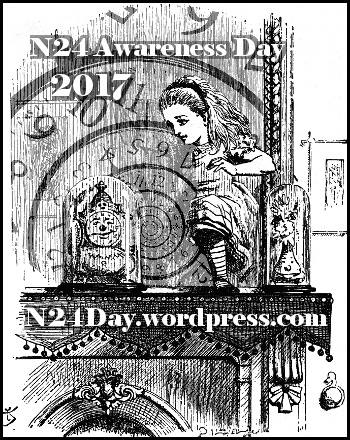 It's that time of year again! Friday, November 24th is the 5th annual N24 Awareness Day, the day the online N24 community has chosen to spread knowledge of our condition (Non-24-hour sleep-wake disorder aka Non-24 or N24). To commemorate the day you are encouraged to write, draw, compose, film, or otherwise depict your experience of N24 for a world that has far too little awareness of our existence, let alone what our lives are like.
It's that time of year again! Friday, November 24th is the 5th annual N24 Awareness Day, the day the online N24 community has chosen to spread knowledge of our condition (Non-24-hour sleep-wake disorder aka Non-24 or N24). To commemorate the day you are encouraged to write, draw, compose, film, or otherwise depict your experience of N24 for a world that has far too little awareness of our existence, let alone what our lives are like.
This year's theme is "Through the Looking Glass." Most people are familiar with the story of Alice, who passed through the looking glass into Wonderland, where everything was strange and different. Those of us with N24 pass through our own sort of looking glass, spiraling down a rabbit hole of twisted time. Because our body/brain clocks set us virtually travelling through time zones, we inhabit our own looking glass world, living among others but always set apart by the barriers of time -- as invisible but often as impassable as panes of glass.
To participate in N24 Awareness Day, all you have to do is post something somewhere on or near November 24th. We have N24 so we're not really bound by clocks and calendars, right? If you don't have anyplace to post your contribution or if you'd like to have it also published elsewhere, you are very welcome to submit it to the N24 Awareness Day blog at https://n24day.wordpress.com/
You can also pick up this year's participation badge at the blog: n24day.wordpress.com/participation-icons/. Feel free to use the participation icon any way you choose. It's great if you want to link it back to the blog, but that's not required. Feel free to copy the icon to your own server or just directly link to it from the blog.
Here's hoping we all have another creative, productive N24 Awareness Day this year!
A related article in honor of N24 Day, also by James Fadden, about the Nobel Prize for circadian rhythms appears here.
 Oct 23, 2017
Oct 23, 2017
CSD-N Board of Directors welcomes our new secretary, Jen Heller Meservey. Thanks, Jen, for volunteering to help.
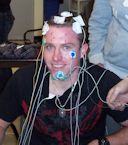 Oct 2017
Oct 2017
CSD-N is looking to create a list of sleep labs that will accommodate sleep tests (polysomnograms) at our unusual sleep hours. We believe that a lot of the diagnostic value of a polysomnogram is lost when you aren't sleeping at a time determined by your body's internal clock. So It would be of great value to our community to know which labs will adjust to allow patients to sleep at the time appropriate for them.
If you know of such a lab, please send the information to
Thanks to Karen Martin for initiating this project.
The goal is to post a list of sleep labs, analogous to our doctor list. And, by the way, if you can recommend a doctor who is knowledgeable about DSPD and/or Non-24 (and isn't already on our list), please send us that information too.
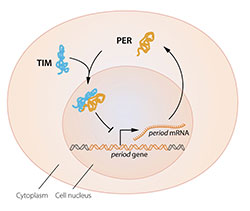 Oct 2, 2017
Oct 2, 2017
The Nobel Assembly at Karolinska Institutet has awarded
the 2017 Nobel Prize in Physiology or Medicine
jointly to Jeffrey C. Hall, Michael Rosbash, and Michael W. Young
for their discoveries of molecular mechanisms controlling the circadian rhythm.
"[Dr.] Young said that one of the most important areas of study built on their work is what happens when the clock runs too fast or too slow. Most recently, scientists have discovered that one percent of humans worldwide have a mutation in the clock genes that is associated with delayed sleep or being a night owl. He said many of these individuals show up at sleep clinics wondering what to do, and the work provides a target to work on."
—
Washington Post, Oct 2, 2017
Oct 2017
Right now, Congress is deciding on federal funding for various programs and activities in FY2018, including programs that distribute funding to talented researchers at leading academic medical centers.
Sleep disorders impact millions of Americans (including veterans), and it is essential that Congress continue to support vital funding for sleep research. However, it is up to us to educate our legislators on how sleep disorders impact our lives.
Your voice matters! Project Sleep's president & founder, Julie Flygare, will be on Capitol Hill in November with other sleep community leaders and THEY WILL HAND DELIVER LETTERS from you to your Members of Congress at their DC Offices!
Here's a video from Julie Flygare, who is organizing this campaign, telling us why this is urgent. But please use the CSD-N version of the letter.
Please submit your letter today, because the Oct. 27th deadline is quickly approaching. If you have any questions, please e-mail info@project-sleep.com. Thanks to Project Sleep for initiating this campaign. And thank you for your support,
Oct 2017
Circadian Sleep Disorders Network will be holding elections for its Board of Directors, and is seeking some new faces. Requirements are described in
www.circadiansleepdisorders.org/docs/ReqDir.php. Meetings are held by online forum, so you can log in at any time of day to participate. Meetings do continue for a month or more, requiring you log in once every day or two during that time..
If you're interested, please let us know soon (latest Nov 10), following the instructions at the end of the above document. Directors start serving January 15, 2018.
We are also looking for a new secretary, and other volunteers willing to help out. The secretary can be a board member but does not have to be. The main duty of the secretary is to write up minutes of the meetings, which are held by online forum. If you're interested, please let us know soon, by email sent to .
Sept 2017
Circadian Sleep Disorders Network is setting up a venue for circadian rhythm disorder (CRD) people in the local DC/MD/NoVA area to meet others with CRDs. Depending on interest, this may become a regular support group.
| When: | Monday, October 23, starting at 7:00 pm | |
| Where: | Holy Cross Hospital 1500 Forest Glen Road Silver Spring, MD 301.754.7907 Education Room #3 |
Note that there is a parking fee of $2 per hour at the hospital. The hospital is half a mile from the Forest Glen Metro station (red line) - some folks may prefer to come that way. If there is interest, and people are willing to arrive sufficiently early, a volunteer could pick a few people up at the Metro stop and drive them back afterwards. Please let us know in advance if you would like to be picked up from the Metro station ().
We would like some idea of how many people plan to come. Please let us know () if you are planning to come, or if you would like to meet in the future but can't make the date or place this time.
People at the Narcolepsy Network conferences often mention how empowering it's been for them to meet other people with the same disorders and similar challenges and struggles.
Thanks to Kathy Shartzer, who volunteered to find us a place to meet, and made the arrangements with the hospital.
A link to our website has been added to the Netherlands Sleep-Wake organization Nederlandse Vereniging voor Slaap- Waak Onderzoek (NSWO), thanks to efforts by our secretary, Annechien Foeth.
And the Société Française de Recherche et Médecine du Sommeil (SFRMS) is promoting our registry on Facebook and Twitter, thanks to one of our volunteers. Unfortunately, their Facebook page is only visible to people in France (or perhaps the EU?), not in the U.S.
Sept 2017
Our vice president James Fadden and Dr. Katherine Sharkey have completed an update of their report on
Non-24-hour sleep-wake disorder for the National Organization of Rare
Disorders (NORD). You can read it at https://rarediseases.org/rare-diseases/non-24-hour-sleep-wake-disorder/.
In 2012 CSD-N requested that NORD include Non-24 in their database of rare disorders. James Fadden wrote the original report for the database along with Dr. Sharkey of Brown University. It was published in 2013.
The updated report contains new information published during the last four years. There are new sections on Differences in Cellular Clock Function and on Genetics, as well as other changes throughout the report. There are also many new references.
It is probably the most thorough reference available on the symptoms, physiology, and causes of both blind and sighted Non-24. The report discusses treatments but not in the same degree of detail. That is the policy of NORD which prefers their reports to focus on descriptions of the disorders rather than treatments.
 CSD-N has joined the PatientsCount Network, a directory of organizations, which is
available to patients and researchers.
You can see our organization profile here.
CSD-N has joined the PatientsCount Network, a directory of organizations, which is
available to patients and researchers.
You can see our organization profile here.
 Aug 2017
Aug 2017
CSD-N secretary Annechien Foeth was interviewed about DSPS. You can watch the video
here.
It is entirely in Dutch. YouTube can provide subtitles in a language of your choice: click on CC, then Options/Subtitles/Autotranslate/English (or whichever language you choose).
It's still quite garbled - I suspect the auto-transcriber didn't transcribe some of the Dutch words correctly, let alone subsequently feeding it to an imperfect translation program.
We're happy to be raising awareness wherever we can.
Aug 2017
 With great sadness I have to report the death of Beth Macdonald. I've known Beth on the Niteowl email list for over 15 years. She was an active participant, welcoming new people and sharing her experiences with delayed sleep phase. She was one of the founders of Circadian Sleep Disorders Network back in 2011, and served on its Board of Directors ever since. She posted frequently on various Facebook groups (as Nina Beth), and was supportive of new group members and often answered their questions about CRDs.
She maintained the accuracy of various circadian sleep disorder entries in Wikipedia, and often wrote journalists and others about inaccuracies in their articles on sleep.
And she was a friend.
With great sadness I have to report the death of Beth Macdonald. I've known Beth on the Niteowl email list for over 15 years. She was an active participant, welcoming new people and sharing her experiences with delayed sleep phase. She was one of the founders of Circadian Sleep Disorders Network back in 2011, and served on its Board of Directors ever since. She posted frequently on various Facebook groups (as Nina Beth), and was supportive of new group members and often answered their questions about CRDs.
She maintained the accuracy of various circadian sleep disorder entries in Wikipedia, and often wrote journalists and others about inaccuracies in their articles on sleep.
And she was a friend.
More details from her sister:
She was born to William and Alice Macdonald in Seattle, WA on June 10, 1942. She had a brother born in 1945, and a sister born in 1949. The family lived in Anchorage, AK, Friday Harbor, WA, Renton, WA, and Seattle, WA. Neena graduated from Roosevelt High School in Seattle. She was active in the Mountaineers (skiing, hiking, climbing) and Skandia Folkdance Club, and performed with Nordiska Folkdance while in Seattle. She moved to Norway in 1971. She remained in Norway with occasional visits "home" to visit family and friends in the US. She was a teacher, had a large online presence in groups including genealogy and circadian sleep disorders, and she was a good friend to many. She died on July 6, 2017 in Bergen from complications related to cancer.
Aug 2017
CSD-N has implemented the secure HTTPS protocol for all of its website.
This means that website content is encrypted prior to transmission, and any user content (such as when you join) is encrypted prior to transmission to us.
This is handled behind the scenes by your browser. Many browsers display a lock symbol in the address bar to confirm this.
(Note that even before this change, any financial information you submitted to PayPal was encrypted by virtue of being sent directly to PayPal.
Same for registry/survey information, which went directly to AltaVoice.)
Prior to this change some browsers issued security warnings when users entered the password to retrieve member information.
The change to https fixes any insecurity, so these warnings should no longer appear.
All our URLs (web addresses) now start with https: instead of http:, but the rest of the URL is unchanged.
Any links you saved previously will continue to work, but will automatically be redirected to use the encrypted communication.
June 27, 2017
Last spring we received email from BBC (U.K. broadcast network) asking whether we could discuss sleep disorders in visually impaired people for a blind and visually impaired audience. Board member Lynn McGovern agreed to sit for the interview. It was edited and aired as part of a larger radio program, Why Can't I Sleep, the June 27, 2017 edition of In Touch. You can listen to it here; Lynn's segment starts 5 minutes into the program and runs about 4 minutes.
 June 22-23, 2017
June 22-23, 2017
The NIH (U.S. National Institutes of Health) Sleep Disorders Research Advisory Board (SDRAB)
met June 22-23, 2017, to work on updating their research plan.
Susan Plawsky, our patient representative on the board, participated. She emphasized the lack of sleep research done
on circadian-disordered patients - most of what is done studies normal sleepers, and then treatment is based on that.
We need more research on actual DSPD and Non-24 people.
One problem with studying CRD people is that it is difficult to determine a person's circadian phase.
One of the researchers on the panel is developing a blood test for circadian markers.
This of course would help immeasurably in diagnosis and treatment as well as research.
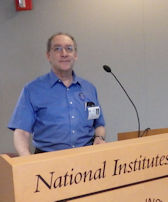 Another problem is the difficulty in finding CRD people with desired characteristics to study.
Our registry is intended to help with that.
Another problem is the difficulty in finding CRD people with desired characteristics to study.
Our registry is intended to help with that.
Peter Mansbach, CSD-N President, presented some preliminary results from our survey. You can hear the audio (re-enacted) with slides as a video, view just the slides from the talk, or read the text.
One other CSD-N member attended in person and spoke, and another spoke by web connection. They emphasized the difficulty of living with our disorders.
Their remarks were well-received by the board.
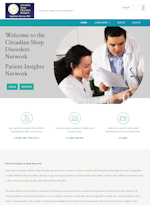 June 2017
June 2017
Circadian Sleep Disorders Network, in partnership with AltaVoice, a wholly owned subsidiary of Invitae Corporation, is sponsoring a registry and survey.
Please take the survey, if you have not already done so.
We need more participants to be able to find connections between answers, for example whether perceived sensitivity to light can predict which treatments work best.
And researchers want more participants so they can select people with the characteristics they want to study.
Here are some highlights of the preliminary results:
View more results, with numbers and charts, at www.circadiansleepdisorders.org/registry/survey_results_prelim.php. These are preliminary results based on responses of the 208 people who have completed the survey as of May 28.
For more information on the survey itself, see www.CircadianSleepDisorders.org/registry/registry.php.
June 2017
Good to see some recognition from the AASM (American Association of Sleep Medicine) researchers of the difficulties many of us have complained about.
"The Circadian Sleep Disorders Network (www.circadiansleepdisorders.org), a nonprofit patient advocacy group, reports members' concerns regarding recognition of their conditions (even among sleep specialists), and related difficulties with access to care"
—Auger RR, Burgess HJ, Emens JS, Deriy LV, Sharkey KM, Do Evidence-Based Treatments for Circadian Rhythm Sleep-Wake Disorders Make the GRADE? Updated Guidelines Point to Need for More Clinical Research, Journal of Clinical Sleep Medicine, 11(10), 2015 (https://www.ncbi.nlm.nih.gov/pmc/articles/PMC4582047/)
June 2017
The NIH (U.S. National Institutes of Health) Sleep Disorders Research Advisory Board (SDRAB)
will meet again
June 22-23, 2017, to work on updating their research plan.
Susan Plawsky, our patient representative on the board, will participate. Peter Mansbach, CSD-N President, will present some preliminary results from our survey.
Several other CSD-N members plan to attend (in person or by web connection) and to speak.
 March 2017
March 2017
The SleepyHeadCentral blog posted a lovely
article on CSD-N, featuring our infographic. SleepyHead Central covers all sleep disorders, but there have been a bunch of blog posts recently highlighting circadian rhythms.
Feb 2017
Our vice president, James Fadden, has been quoted in a new Sleep Review article on light visors,
Light-Emitting Glasses Envision Sleep Disorder Therapy for Patients on the Go.
Feb 2017
Circadian Sleep Disorders Network has launched its PATIENT POWERED REGISTRY AND SURVEY for people with Circadian Rhythm Sleep Disorders. The registry is open to anyone with a circadian rhythm sleep disorder from any country. You can sign up for the registry and
take the survey (it's free) at
https://www.circadiansleepdisorders.org/registry.
By collecting information from a large number of people actually suffering from these disorders, we can stimulate research into causes, treatments, and effects of circadian disorders.
![]() The registry and survey are hosted by AltaVoice (formerly Patient Crossroads), now a subsidiary of
Invitae. AltaVoice provides compliance with HIPAA (U.S. Health Insurance Portability and Accountability Act) privacy requirements. They assure you that you own your data, and that no one can identify you without your permission. They refer to the registry and survey as a "Patient Insight Network" (PIN). Here's an
AltaVoice video describing it.
The registry and survey are hosted by AltaVoice (formerly Patient Crossroads), now a subsidiary of
Invitae. AltaVoice provides compliance with HIPAA (U.S. Health Insurance Portability and Accountability Act) privacy requirements. They assure you that you own your data, and that no one can identify you without your permission. They refer to the registry and survey as a "Patient Insight Network" (PIN). Here's an
AltaVoice video describing it.
They host similar PINs for 100 organizations representing 400 diseases. Other clients include the U.S. National Institutes of Health (NIH) and the U.S. Patient-Centered Outcomes Research Institute (PCORI).
Note that your information is de-identified: anyone accessing the survey responses does not know whose responses they are. To be contacted by researchers you must first agree to be contacted by AltaVoice for research; and subsequently, if a researcher requests AltaVoice to contact people with certain responses, AltaVoice will request you to contact the researcher. Your name and contact information are not given out without your explicit permission.
 Completing the survey can take half an hour or more, but you can stop part-way through and return later. After you complete it, you can see aggregated results showing the breakdown of responses.
Completing the survey can take half an hour or more, but you can stop part-way through and return later. After you complete it, you can see aggregated results showing the breakdown of responses.
By working together and sharing information, we can transform medicine in ways that were unimaginable a decade ago. Your participation may result in new therapies, while rapidly increasing our knowledge of disordered circadian processes.
The information you provide can jump-start research on some of the questions we've been asking about for years - but only if enough people participate. Sign up now (free), and please take the survey.
For more information, click here.
And please consider joining Circadian Sleep Disorders Network.
Questions? Problems? Contact us at .
CSD-N is pleased to welcome Dr Sabra M Abbott to its Medical Advisory Board. Dr Abbott is a neurologist specializing in sleep medicine at Northwestern University's Feinberg School of Medicine.
The CSD-N Board of Directors has elected Annechien Foeth as CSD-N Secretary. We thank her for volunteering her time.
Dec 2016: PatientCrossroads is rebranding itself as AltaVoice. This is the company we are using to host the registry and survey, to handle compliance with legal privacy requirements and to assure that your information remains private (even CSD-N cannot see who answered what and how). As a result of this rebranding some of their software is undergoing changes, and so we have not yet opened to the public as we had hoped. We'll keep you posted.
UPDATE Jan 2017: On Jan 6 AltaVoice was acquired by Invitae. We have been assured that AltaVoice's support of patient-powered registries is not changing, and we are in the final stages of testing our survey. We expect to go public shortly.
Voting for the Circadian Sleep Disorders Network Board of Directors has completed. The winners are:
We note that the election resulted in board members "transcending time zones" - they reside in six countries (in addition to living on different circadian schedules): three are in the U.S., and one each in Belgium, France, Ireland, Norway, and The Netherlands.
Archived News 2016
Archived News 2015
Archived News 2014
Archived News 2013
Archived News 2011 - 2012 (incomplete)